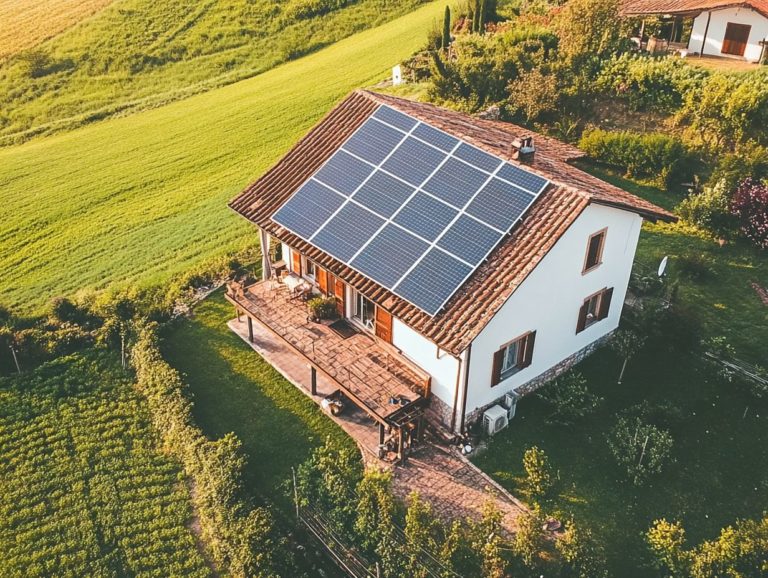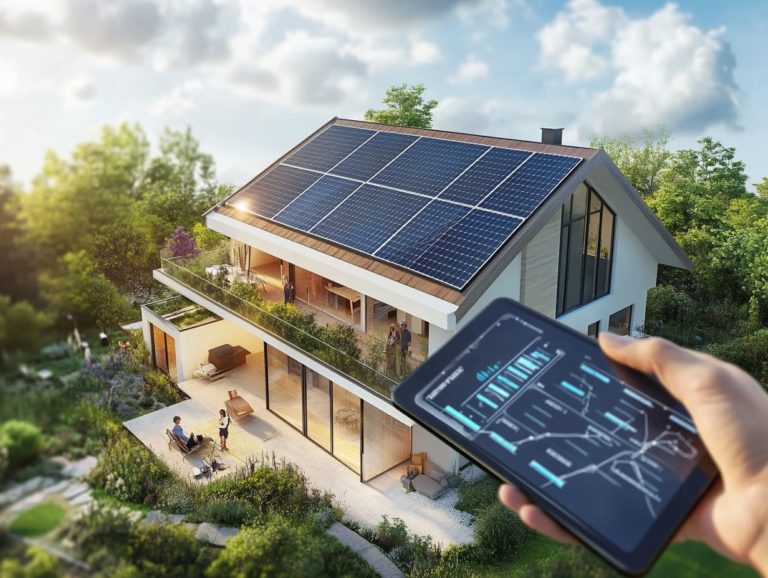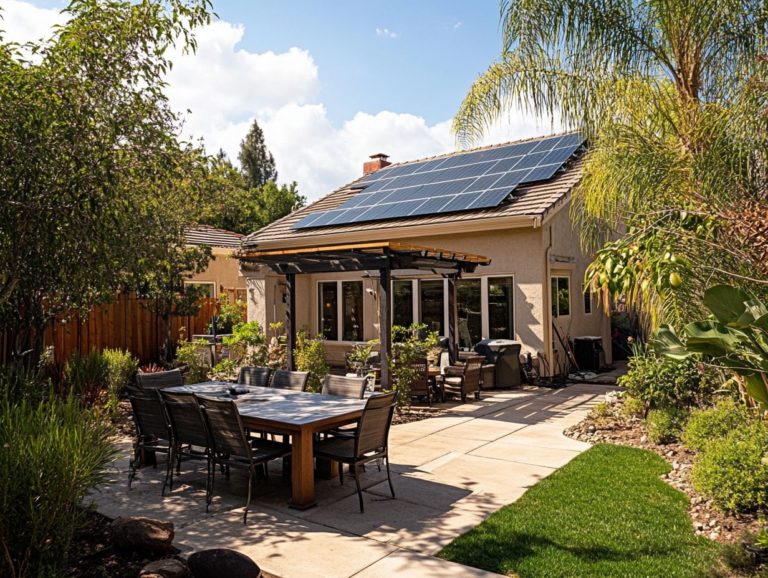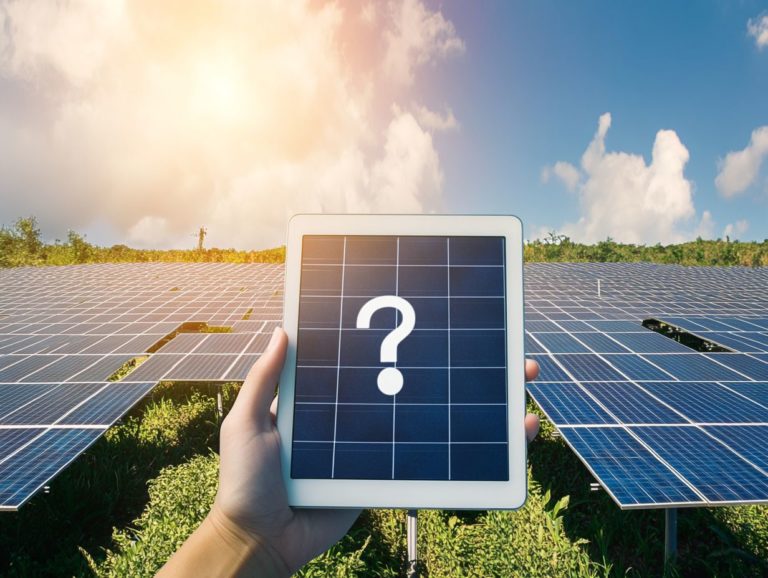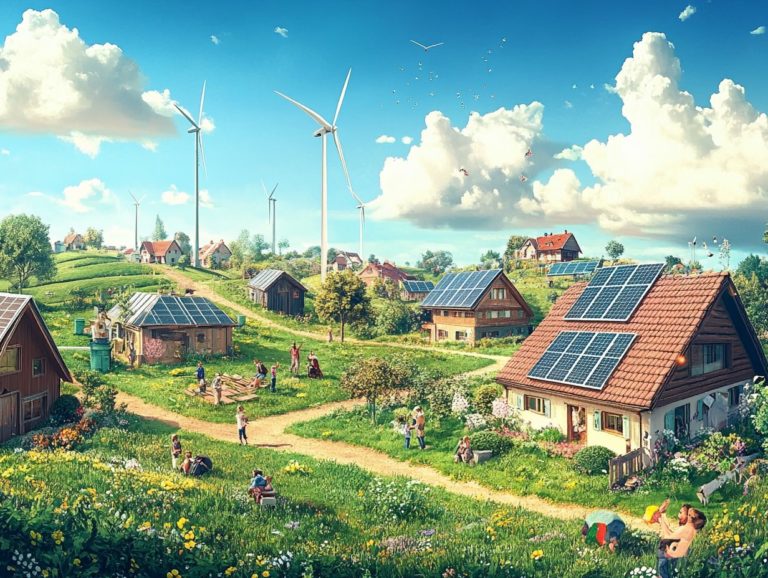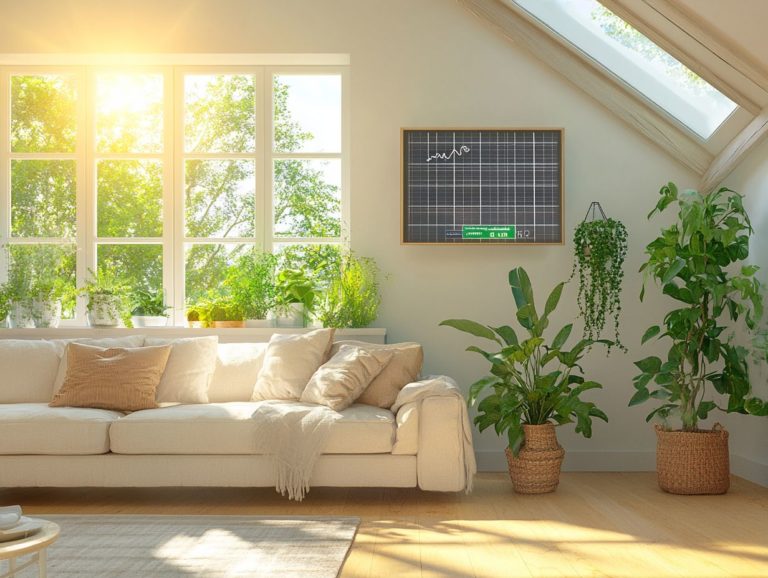“5 Ways to Optimize Your Home’s Solar Energy Use”
Harnessing solar energy is an impactful way for you to reduce your carbon footprint while saving on energy costs. Let s dive in and explore how you can harness the sun s power and transform your home today!
This article delves into five effective strategies that will optimize your home s solar energy use, ranging from installing a solar battery storage system to incorporating energy-efficient appliances and smart home technology.
You ll find essential topics covered, including passive solar design, maintenance tips for solar panels, and answers to common questions about solar energy systems.
Discover how to maximize this renewable resource and enjoy the many benefits it brings to your home.
Contents
- Key Takeaways:
- 1. Install a Solar Battery Storage System
- 2. Use Energy-Efficient Appliances and Lighting
- 3. Implement Smart Home Technology
- 4. Utilize Passive Solar Design Techniques
- 5. Regularly Maintain and Clean Your Solar Panels
- What Is Solar Energy and How Does It Work?
- How Can Solar Energy Benefit Homeowners?
- What Are the Factors to Consider When Installing a Solar Energy System?
- How Can One Monitor and Track Their Solar Energy Usage?
- What Are the Common Myths About Solar Energy?
- Frequently Asked Questions
- What are the benefits of optimizing my home’s solar energy use?
- How Can I Determine the Best Placement for Solar Panels on My Home?
- What Steps Should I Take to Optimize My Home’s Solar Energy Use?
- Can I Still Use Solar Energy on Cloudy Days?
- Is It Possible to Store Excess Solar Energy for Later Use?
- What Are Some Common Mistakes to Avoid When Using Solar Energy?
Key Takeaways:
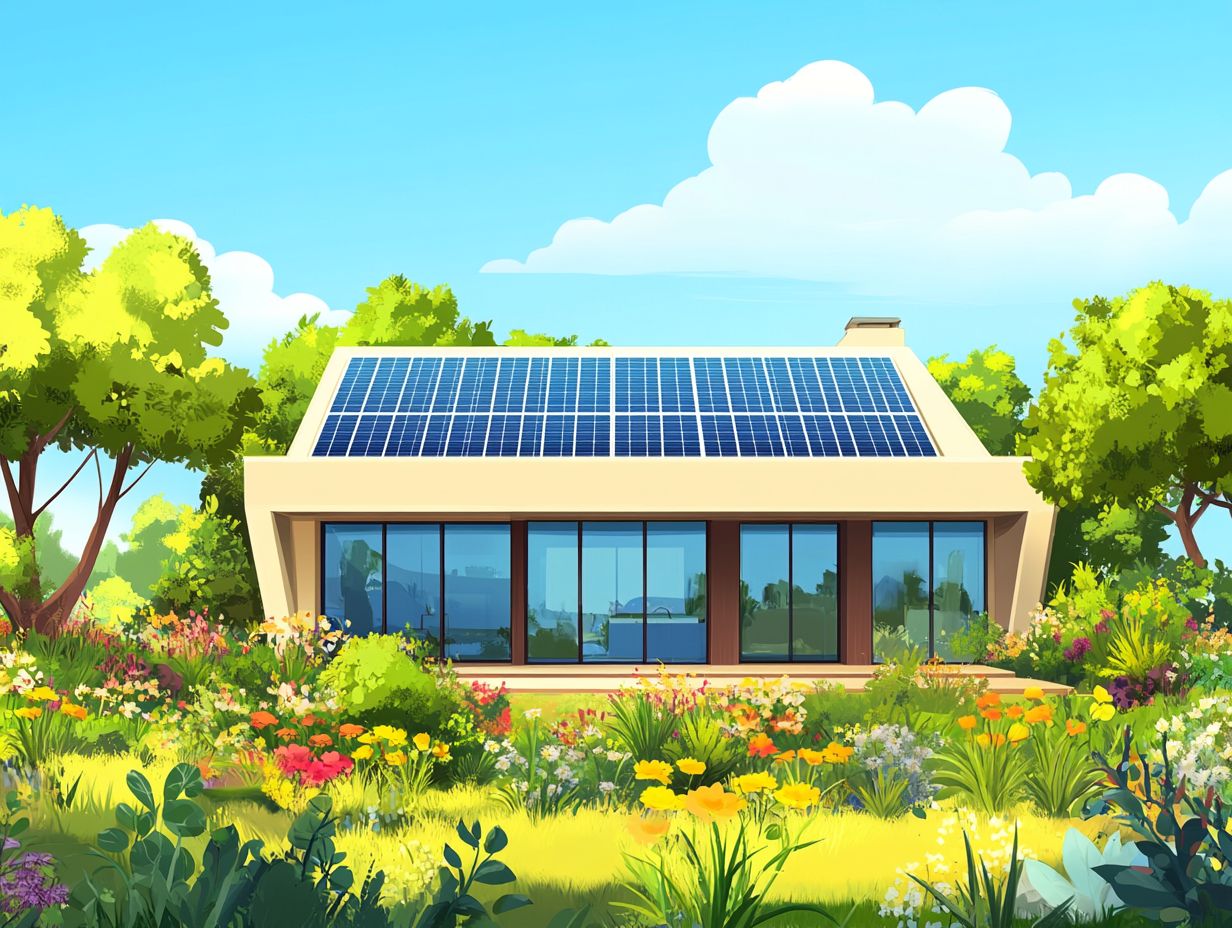
Start by investing in a solar battery storage system today to maximize your home’s solar energy use and reduce reliance on the grid.
Upgrade to energy-efficient appliances and lighting to decrease your energy consumption and save on utility bills.
Implement smart home technology to monitor and control your energy usage, optimizing your solar energy system.
1. Install a Solar Battery Storage System
Installing a solar battery storage system is a key move for optimizing your solar energy setup. It gives you the power to store excess energy production for later use, reducing your dependence on the grid and enhancing your overall energy efficiency.
By capturing surplus energy generated on sunny days, you can significantly lower your electricity bills. You can utilize that stored energy during peak times or at night when rates tend to climb.
Ensuring your solar panels are properly oriented is crucial for maximizing sunlight exposure, which boosts overall energy production. Choosing a professional installer is essential; their expertise guarantees that your battery and solar system work seamlessly together, enhancing efficiency, safety, and longevity.
Combining this technology not only contributes positively to the environment but also offers you considerable savings and peace of mind.
2. Use Energy-Efficient Appliances and Lighting
Incorporating energy-efficient appliances and lighting into your home is a smart move that cuts down on energy consumption and boosts the overall performance of your solar power system. This leads to notable energy savings in the long run.
Consider appliances like Energy Star-rated refrigerators, LED lighting, and high-efficiency washing machines. They are designed to minimize electricity usage while still delivering exceptional functionality.
By using less power, these appliances enable your solar energy system to operate more efficiently, maximizing the sunlight you re able to harness. The synergy created by these energy-saving technologies helps you enjoy lower utility bills as well.
Embracing this path contributes to a more sustainable lifestyle, reducing reliance on fossil fuels and promoting the use of renewable energy sources.
3. Implement Smart Home Technology
Smart home technology helps you monitor and control your energy usage while maximizing the efficiency of your solar power system. This technology allows for real-time performance tracking and energy management, adapting seamlessly to your household’s unique needs.
These advanced systems can monitor your energy usage patterns throughout the day, pinpointing peak consumption times and suggesting adjustments that can lead to significant cost savings.
With their integration capabilities, you can effectively control appliances, lighting, and heating, ensuring energy is consumed only when necessary. By providing detailed insights into your energy performance, you can identify areas for improvement.
Ultimately, this paves the way for a more sustainable and cost-efficient lifestyle. Adopting such technology not only enhances the natural energy harvested from your solar system but also promotes environmentally responsible living.
Ready to unlock the full potential of solar energy? Start implementing these strategies now!
4. Utilize Passive Solar Design Techniques
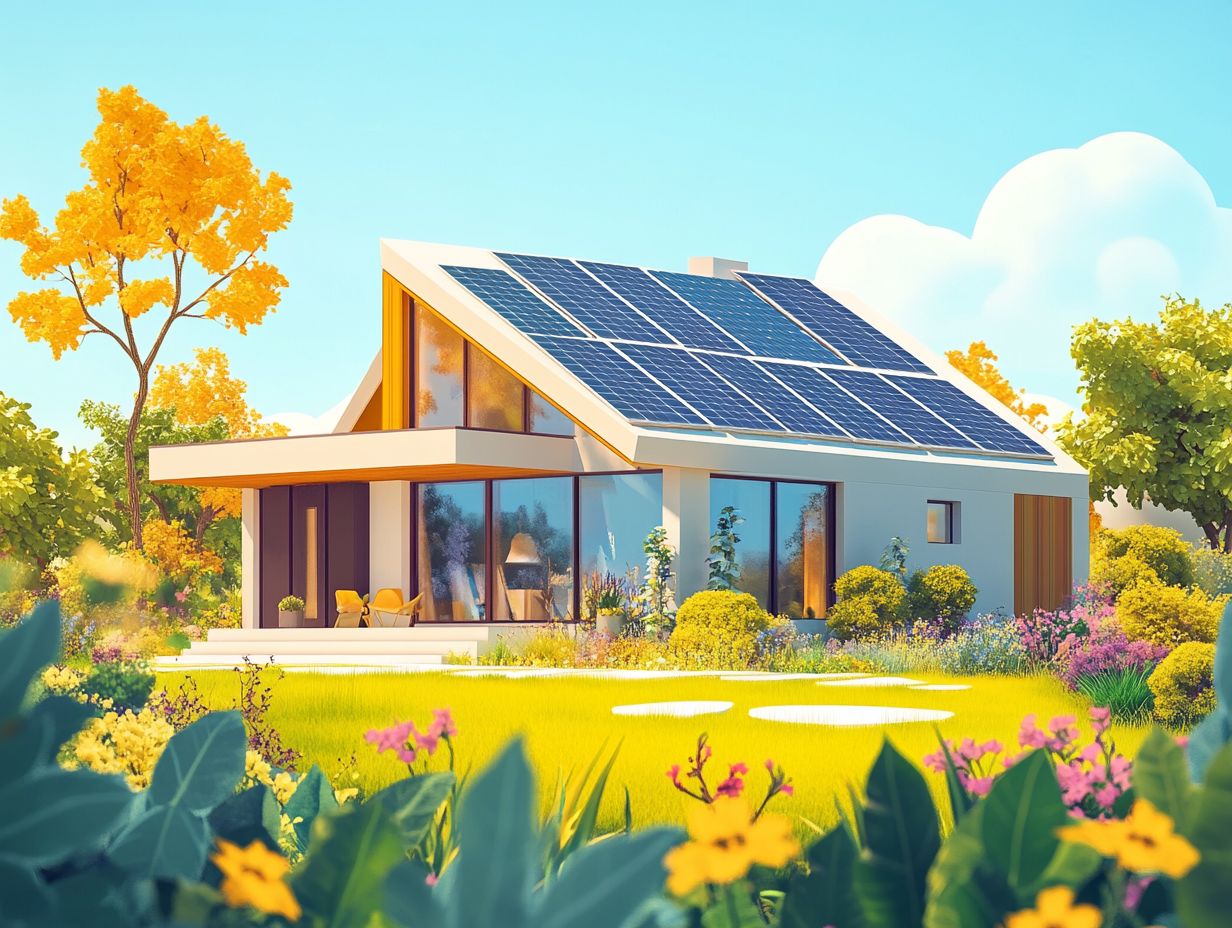
Passive solar design techniques can boost your home s energy efficiency. By getting the most sunlight, you can cut down on artificial heating and cooling, saving energy and money.
Strategically placing windows helps capture natural light, allowing the sun to warm your living spaces while minimizing glare and heat loss. Using heavy materials that hold heat, like concrete or stone, enables you to store warmth during sunny days and release it during cooler nights.
Shading elements, such as overhangs or awnings, prevent excessive heat gain in the summer while still allowing the sun s warmth to filter in during winter. Together, these strategies create a sustainable energy approach, making your home more comfortable and environmentally friendly.
5. Regularly Maintain and Clean Your Solar Panels
Regular maintenance and professional cleaning of your solar panels are essential for peak efficiency and optimal energy production. Over time, dirt and debris can significantly hinder their performance.
Implementing a consistent maintenance schedule extends the lifespan of your system and maximizes your return on investment. Hiring a maintenance company allows you to tap into their expertise, ensuring tailored services and timely inspections. This proactive approach helps address potential issues before they escalate.
Keeping your solar panels clean boosts their ability to capture sunlight, ultimately enhancing energy output. Clean the panels at least twice a year, or more often if you live in a dusty area.
Keep an eye on nearby trees that could cast shadows. Minimizing these obstructions helps your panels perform at their absolute best.
What Is Solar Energy and How Does It Work?
Solar energy is an amazing way to harness the sun s power for a cleaner future! It allows you to use solar cells within a solar power system to convert sunlight into electricity, making it a sustainable and environmentally friendly energy source.
The journey begins with solar panels, which consist of numerous photovoltaic cells designed to absorb sunlight. When sunlight strikes these cells, it energizes the electrons, creating direct current (DC) electricity.
However, homes and businesses typically operate on alternating current (AC) electricity, so inverters are necessary. These devices transform the DC electricity generated by the solar panels into AC electricity, making it suitable for everyday use.
This innovative approach not only produces clean energy but also significantly reduces reliance on fossil fuels, paving the way for a greener future.
What Are the Different Types of Solar Energy Systems?
You have a variety of solar energy systems at your disposal, including those that use monocrystalline and polycrystalline cells. Each type offers distinct advantages and efficiencies that cater to your specific energy needs.
For example, monocrystalline systems are known for their high efficiency and compact design, making them ideal for residential installations where roof space is limited.
Conversely, while polycrystalline systems may be slightly less efficient, they often come with a more budget-friendly price tag, making them a wise choice for larger setups where cost is a concern.
Incorporating solar batteries is vital for energy storage, enabling you to store excess energy generated on sunny days for use during overcast weather or nighttime. This feature boosts the reliability and overall effectiveness of solar energy systems, paving the way for a more sustainable energy future.
How Can Solar Energy Benefit Homeowners?
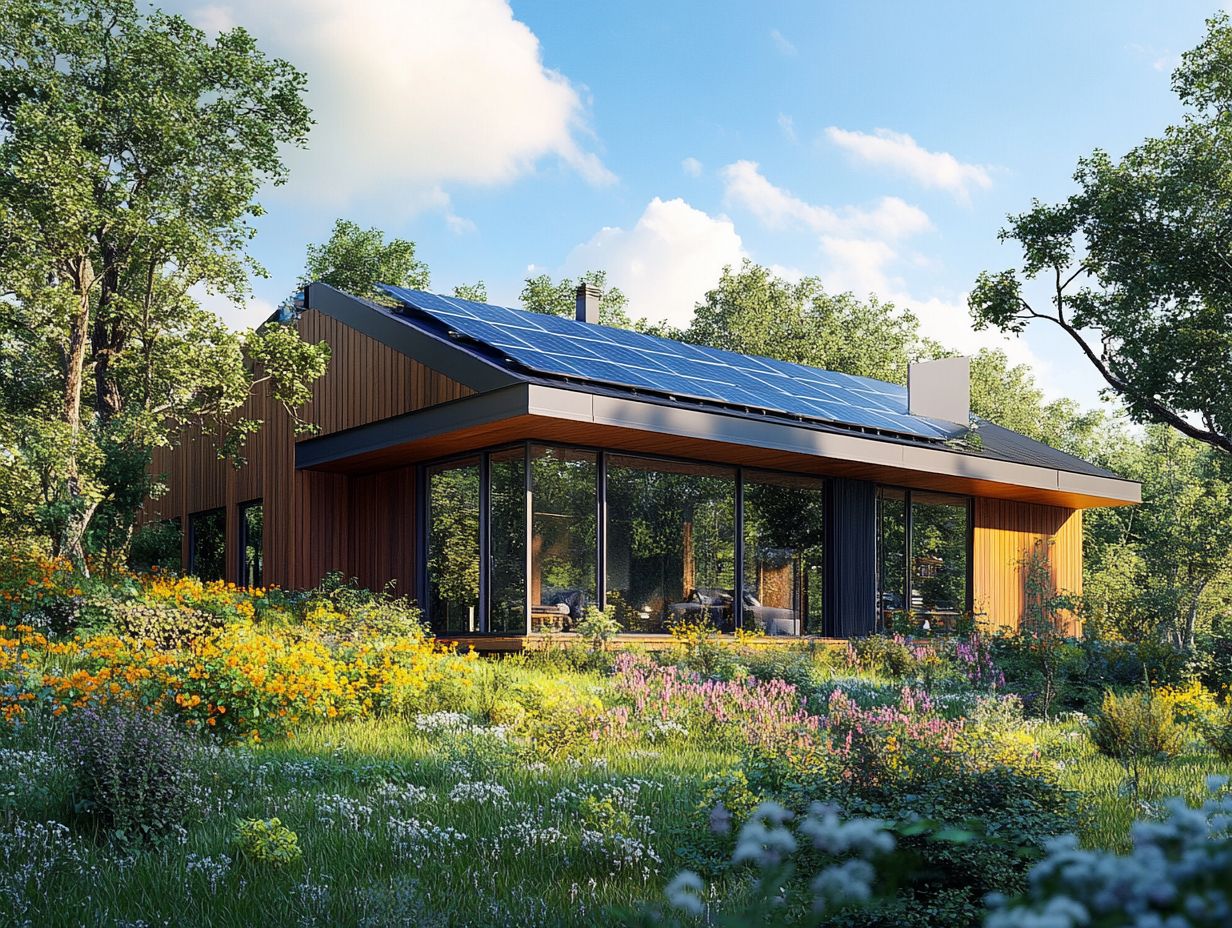
Solar energy offers many advantages for homeowners. These include significant energy savings, less reliance on traditional energy sources, and positive environmental impacts, all of which contribute to an impressive return on investment.
Beyond simply lowering your monthly utility bills, embracing this renewable resource grants you energy independence and stability amid fluctuating energy prices. When you make the switch to solar, you re likely to see an increase in your property value, making this choice both energy-efficient and financially savvy.
By reducing your carbon footprint, you align yourself with global initiatives to combat climate change, fostering a healthier planet for future generations. Harnessing solar power also creates jobs in green technology, boosting local economies and ensuring that communities flourish sustainably.
What Are the Factors to Consider When Installing a Solar Energy System?
When you decide to install a solar energy system, there are several key factors to consider. First and foremost, think about the proper orientation of the panels, potential shading issues, and the importance of choosing a good installer to ensure your system works well.
Your geographical location is crucial in determining the system’s efficiency; areas blessed with ample sunlight will naturally yield better results.
The type of solar panel you choose whether monocrystalline, polycrystalline, or thin-film can significantly impact your overall energy production. It s essential to be aware of local regulations and incentives that could affect your installation process, such as zoning laws and net metering policies.
By carefully assessing your roof’s angle and ensuring minimal obstruction from trees or buildings, you can maximize the benefits of your solar setup, ultimately guiding you toward a more sustainable energy solution.
How Can One Monitor and Track Their Solar Energy Usage?
Monitoring and tracking your solar energy usage is crucial for maximizing efficiency and gaining a deeper understanding of your energy consumption patterns. Advanced monitoring tools and energy management systems make this a seamless experience.
Consider these effective tools to monitor your solar energy:
- Real-time monitoring apps
- Smart inverters
- Performance analytics platforms
These resources can significantly enhance your ability to oversee solar energy production and consumption. They offer invaluable insights into daily energy generation and give you the power to make informed decisions based on solar availability.
By harnessing detailed data reports and alerts, you can quickly identify any inefficiencies within your system, ensuring potential performance optimizations are addressed without delay.
Embracing these solutions not only boosts your overall system performance but also contributes to a sustainable energy future by promoting responsible consumption.
What Are the Common Myths About Solar Energy?
There are several common myths surrounding solar energy that can mislead you about its effectiveness, improvements in efficiency, and technological advancements that have made solar power systems more accessible and reliable.
You might think that installing solar panels is prohibitively expensive, but that overlooks the various financing options and incentives available. Misconceptions about their performance often arise, leading some to assume that solar energy cannot generate adequate power in less sunny regions.
In reality, modern systems are designed to capture sunlight effectively, even on cloudy days. Concerns about maintenance may also deter you, but the truth is that solar panels require minimal upkeep mostly just cleaning and occasional inspections.
By clarifying these misconceptions, you can make informed decisions about embracing renewable energy sources.
Frequently Asked Questions
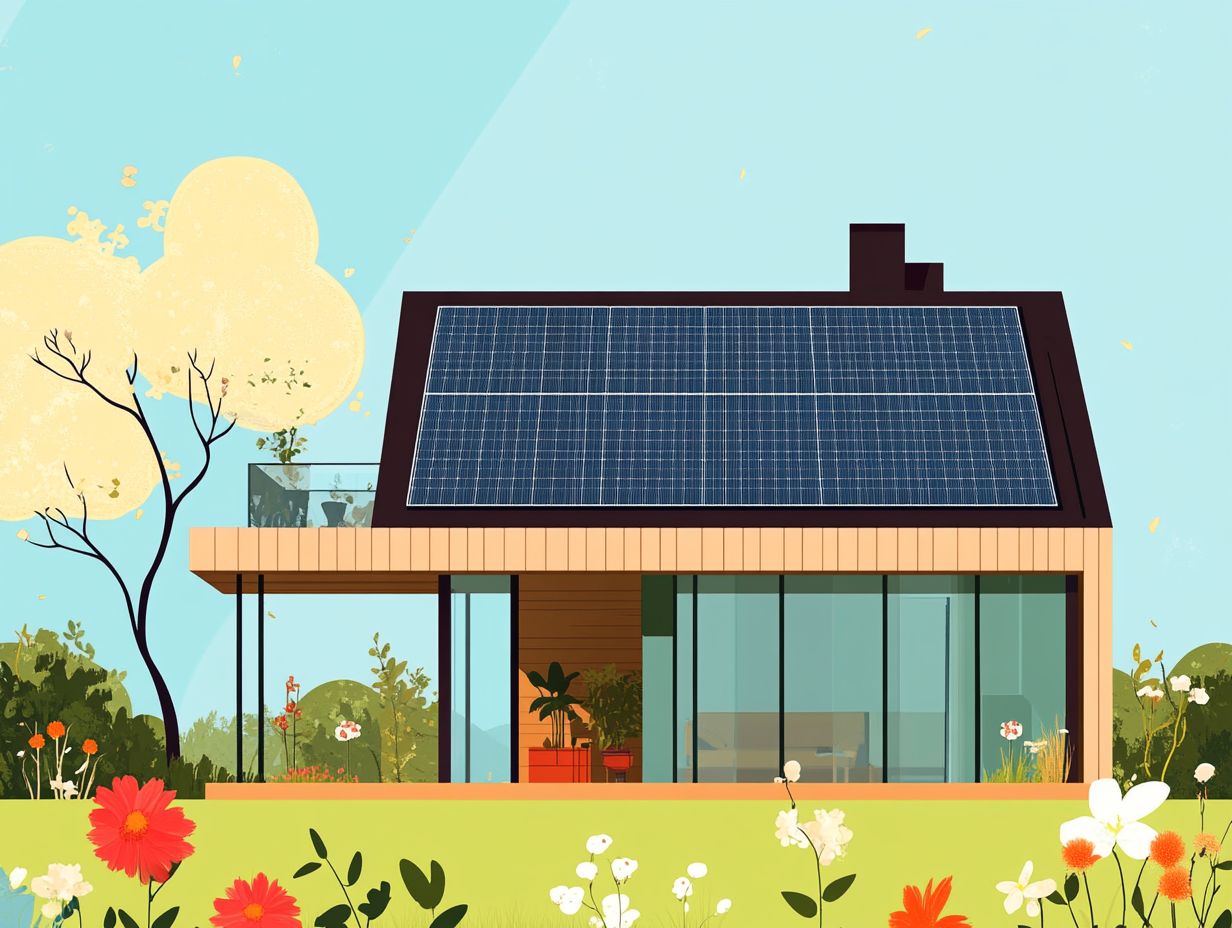
What are the benefits of optimizing my home’s solar energy use?
By optimizing your home’s solar energy use, you can save big on your electricity bills, reduce your carbon footprint, and increase the value of your home.
Start your solar journey today and reap the rewards!
How Can I Determine the Best Placement for Solar Panels on My Home?
Typically, the best placement for solar panels is on a south-facing roof with minimal shading. You can also consider ground-mounted options or east/west-facing panels based on your home’s layout.
What Steps Should I Take to Optimize My Home’s Solar Energy Use?
Besides placing solar panels correctly, regularly maintain and clean them. Upgrade your home with energy-efficient options like LED lights and energy-saving appliances.
Can I Still Use Solar Energy on Cloudy Days?
Yes! Even on cloudy days, solar panels generate electricity. They might produce less energy, but they’re still a cost-effective and eco-friendly choice.
Is It Possible to Store Excess Solar Energy for Later Use?
Absolutely! You can store excess energy in a special battery to use later. This is especially helpful during peak energy demand or cloudy days.
What Are Some Common Mistakes to Avoid When Using Solar Energy?
- Installing panels in shaded areas.
- Neglecting regular maintenance and cleaning.
- Not sizing the system correctly for your energy needs.

